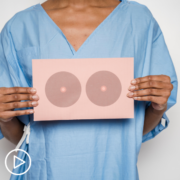How Is Breast Cancer Explained to Newly Diagnosed Patients?
How Is Breast Cancer Explained to Newly Diagnosed Patients? from Patient Empowerment Network on Vimeo.
What’s important for newly diagnosed breast cancer patients to know? Expert Dr. Demetria Smith-Graziani shares how she explains breast cancer to her patients and advice to patients to help ensure their optimal care.
Demetria Smith-Graziani, MD, MPH is an Assistant Professor in the Department of Hematology and Medical Oncology at Emory University School of Medicine. Learn more about Dr. Smith-Graziani.
[ACT]IVATION TIP
“…ask your doctor about what type of breast cancer you have and what cells that your breast cancer came from.”
Download Guide | Descargar Guía en Español
See More from [ACT]IVATED Breast Cancer
Related Resources:
|
|
|

Noted Racial, Ethnic, and Socioeconomic Disparities In Breast Cancer Outcomes |
Transcript:
Lisa Hatfield:
Dr. Smith, how do you explain breast cancer to your newly diagnosed patients, knowing that they probably have heard about breast cancer or may even know somebody who has been impacted by breast cancer, this is your newly diagnosed patient, how do you explain that in detail with them?
Dr. Demetria Smith-Graziani:
So breast cancer starts when normal cells in the body or in the breast develop mutations that are changes in their DNA, and those changes caused them to grow and divide out of control. So the most common types of breast cancer come from the cells in the milk ducts, or the cells in the glands that make milk, and when the cancer starts in the cells of the milk ducts, we call it ductal cancer, when the cancer starts in the cells that make the milk, those glands, we call it lobular cancer. So my activation tip is to ask your doctor about what type of breast cancer you have and what cells that your breast cancer came from.
Share Your Feedback:
Create your own user feedback survey





